Curcumin suppresses proliferation of colon cancer cells by targeting CDK2
- PMID: 24550143
- PMCID: PMC3988585
- DOI: 10.1158/1940-6207.CAPR-13-0387
Curcumin suppresses proliferation of colon cancer cells by targeting CDK2
Abstract
Curcumin, the yellow pigment of turmeric found in Southeast Indian food, is one of the most popular phytochemicals for cancer prevention. Numerous reports have demonstrated modulation of multiple cellular signaling pathways by curcumin and its molecular targets in various cancer cell lines. To identify a new molecular target of curcumin, we used shape screening and reverse docking to screen the Protein Data Bank against curcumin. Cyclin-dependent kinase 2 (CDK2), a major cell-cycle protein, was identified as a potential molecular target of curcumin. Indeed, in vitro and ex vivo kinase assay data revealed a dramatic suppressive effect of curcumin on CDK2 kinase activity. Furthermore, curcumin induced G1 cell-cycle arrest, which is regulated by CDK2 in HCT116 cells. Although the expression levels of CDK2 and its regulatory subunit, cyclin E, were not changed, the phosphorylation of retinoblastoma (Rb), a well-known CDK2 substrate, was reduced by curcumin. Because curcumin induced cell-cycle arrest, we investigated the antiproliferative effect of curcumin on HCT116 colon cancer cells. In this experiment, curcumin suppressed HCT116 cell proliferation effectively. To determine whether CDK2 is a direct target of curcumin, CDK2 expression was knocked down in HCT116 cells. As expected, HCT116 sh-CDK2 cells exhibited G1 arrest and reduced proliferation. Because of the low levels of CDK2 in HCT116 sh-CDK2 cells, the effects of curcumin on G1 arrest and cell proliferation were not substantially relative to HCT116 sh-control cells. From these results, we identified CDK2 as a direct target of curcumin in colon cancer cells.
Conflict of interest statement
Figures
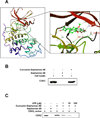
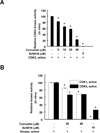
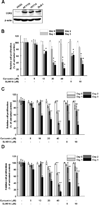
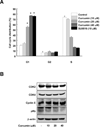
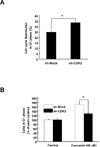
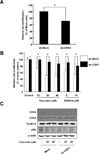
Similar articles
-
A Natural Degradant of Curcumin, Feruloylacetone Inhibits Cell Proliferation via Inducing Cell Cycle Arrest and a Mitochondrial Apoptotic Pathway in HCT116 Colon Cancer Cells.Molecules. 2021 Aug 12;26(16):4884. doi: 10.3390/molecules26164884. Molecules. 2021. PMID: 34443472 Free PMC article.
-
G1-checkpoint function including a cyclin-dependent kinase 2 regulatory pathway as potential determinant of 7-hydroxystaurosporine (UCN-01)-induced apoptosis and G1-phase accumulation.Jpn J Cancer Res. 1999 Dec;90(12):1364-72. doi: 10.1111/j.1349-7006.1999.tb00721.x. Jpn J Cancer Res. 1999. PMID: 10665655 Free PMC article.
-
Curcumin induced modulation of cell cycle and apoptosis in gastric and colon cancer cells.Anticancer Res. 2001 Mar-Apr;21(2A):873-8. Anticancer Res. 2001. PMID: 11396178
-
Activation of PPAR{gamma} by curcumin inhibits Moser cell growth and mediates suppression of gene expression of cyclin D1 and EGFR.Am J Physiol Gastrointest Liver Physiol. 2005 Mar;288(3):G447-56. doi: 10.1152/ajpgi.00209.2004. Epub 2004 Oct 14. Am J Physiol Gastrointest Liver Physiol. 2005. PMID: 15486348
-
Molecular profiling and combinatorial activity of CCT068127: a potent CDK2 and CDK9 inhibitor.Mol Oncol. 2018 Mar;12(3):287-304. doi: 10.1002/1878-0261.12148. Epub 2018 Jan 28. Mol Oncol. 2018. PMID: 29063678 Free PMC article.
Cited by
-
Anti-Cancer Mechanisms of Diarylpentanoid MS17 (1,5-Bis(2-hydroxyphenyl)-1,4-pentadiene-3-one) in Human Colon Cancer Cells: A Proteomics Approach.Int J Mol Sci. 2024 Mar 20;25(6):3503. doi: 10.3390/ijms25063503. Int J Mol Sci. 2024. PMID: 38542474 Free PMC article.
-
Advancing Gastrointestinal Health: Curcumin's Efficacy and Nanopreparations.Molecules. 2024 Apr 7;29(7):1659. doi: 10.3390/molecules29071659. Molecules. 2024. PMID: 38611938 Free PMC article. Review.
-
Reverse Screening Methods to Search for the Protein Targets of Chemopreventive Compounds.Front Chem. 2018 May 9;6:138. doi: 10.3389/fchem.2018.00138. eCollection 2018. Front Chem. 2018. PMID: 29868550 Free PMC article. Review.
-
Key genes and regulatory networks involved in the initiation, progression and invasion of colorectal cancer.Future Sci OA. 2018 Jan 24;4(3):FSO278. doi: 10.4155/fsoa-2017-0108. eCollection 2018 Mar. Future Sci OA. 2018. PMID: 29568567 Free PMC article.
-
Milciclib-mediated CDK2 inhibition to boost radiotherapy sensitivity in colorectal cancer.Front Pharmacol. 2025 Mar 25;16:1557925. doi: 10.3389/fphar.2025.1557925. eCollection 2025. Front Pharmacol. 2025. PMID: 40201697 Free PMC article.
References
-
- Kuttan G, Kumar KB, Guruvayoorappan C, Kuttan R. Antitumor, anti-invasion, and antimetastatic effects of curcumin. Advances in experimental medicine and biology. 2007;595:173–184. - PubMed
-
- Thangapazham RL, Sharma A, Maheshwari RK. Beneficial role of curcumin in skin diseases. Advances in experimental medicine and biology. 2007;595:343–357. - PubMed
-
- Chen A, Xu J, Johnson AC. Curcumin inhibits human colon cancer cell growth by suppressing gene expression of epidermal growth factor receptor through reducing the activity of the transcription factor Egr-1. Oncogene. 2006;25:278–287. - PubMed
-
- Shehzad A, Khan S, Shehzad O, Lee YS. Curcumin therapeutic promises and bioavailability in colorectal cancer. Drugs Today (Barc) 46:523–532. - PubMed
-
- Ryu MJ, Cho M, Song JY, Yun YS, Choi IW, Kim DE, et al. Natural derivatives of curcumin attenuate the Wnt/beta-catenin pathway through down-regulation of the transcriptional coactivator p300. Biochemical and biophysical research communications. 2008;377:1304–1308. - PubMed
Publication types
MeSH terms
Substances
Grants and funding
LinkOut - more resources
Full Text Sources
Other Literature Sources
Research Materials

